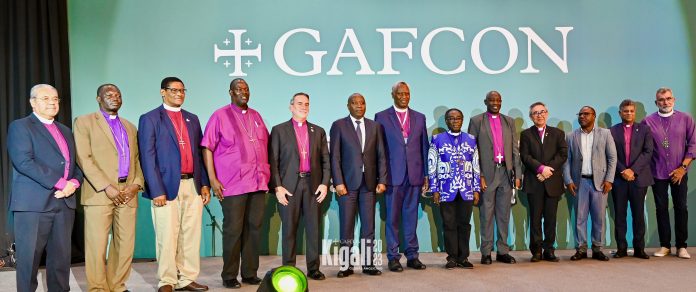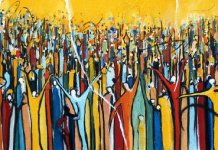The timing could not have been worse for Gafcon. As the 1300 delegates gathered in Kigali, Rwanda, for the Global Anglican Futures Conference (Gafcon), news broke that Ugandan President Yoweri Museveni would back an anti-gay bill includes the death penalty.
But the Ugandan head of state wanted modifications, including provisions for gay people to be rehabilitated, according to Africa News arguably softening the bill a little.
The Archbishop of the church Uganda, a member of the Gafcon Primates Council, had called for these provisions in February. In the run-up to the bill, Archbishop Samuel Kaziimba Mugalu urged all religions to open centres to provide counselling and support to people who could have been involved in homosexuality; the Monitor reported.
The anti-gays laws act is an anti-colonialist talisman in the Ugandan context, and the degree to which they are enforced is contested.
The enforcement of Ugandan law is not simple, with the death penalty seemingly in disuse. But adding the death penalty to anti-LGBTQ legislation and making expressing sexual identities illegal makes life fraught for sexual minorities and opens up blackmail and other forms of oppression and discrimination in addition to how the law is enforced.
The political situation in Uganda, just North of where Gafcon was meeting, was of obvious concern to those drafting the statement to come out of the Kigali conference.
“It is a tightly negotiated document,” one Gafcon Statement drafting committee member told me. Any well-informed reader of the “Kigali Commitment” can infer that. But this writer is aware that the negotiations extended outside the committee room, particularly involving Primates. After a draft statement was read to the conference mid-week, over 500 submissions were returned. In addition, a mail chimp survey was also used to test the delegates’ views of many sections.
However, on contentious issues, the Primates were clearly kept abreast and consulted about the drafting. An example is the Primate of Uganda and the sections on Homosexuality.
The statement’s section on homosexuality was weakened during the re-drafting process, in the view of The Other Cheek and possibly many other delegates. Gafcon asked that we avoid redaction criticism, and this writer is bending that rule.
The draft statement viewed by delegates spoke of pastoral care for same-sex attracted persons in our churches. That is, LGBTQIA people are present.
But that wording, possibly an ambit claim, disappeared.
Lee Gatiss of the Church Society, England, reported on the crucial passage. https://www.churchsociety.org/resource/the-kigali-commitment-the-statement-from-gafcon-4/
“GAFCON does not endorse the homophobia and harsh secular laws against such people that have been seen in some parts of the world recently. ‘We affirm that every person is loved by God, and we are determined to love as God loves’, they say.
“Referring back to the 1998 Lambeth Conference resolution on this matter, GAFCON reiterates that ‘we oppose the vilification or demeaning of any person including those who do not follow God’s ways since all human beings are created in God’s image. We are thankful to God for all those who seek to live a life of faithfulness to God’s Word in the face of all forms of sexual temptation. We pledge ourselves afresh to support and care for one another in a loving and pastorally sensitive way as members of Christ’s body.’
“This, of course especially includes those who experience same-sex attraction, but the statement helpfully reminds us that sexual temptation is something that affects every single one of us, not just one particular group.”
The most unfortunate change from the earlier draft is that the statement does not refer to LGBTQIA persons directly, but they are included in “those who do not follow God’s ways.” Again, this circumlocution indicates the pressures on the drafting committee.
The drafting committee included a trio of Australians who would have had a powerful influence on the wording. Bishop Michael Stead, Archdeacon Kara Hartley and Mark Thompson, principal of Moore College, might be unlikely radicals, but along with Anne Kennedy from the US and Andrew Symes from the UK, would have pushed hard for a balanced statement on LGBTQIA persons. Again, they might be regarded as unlikely radicals, but they advocated the balance of the 1998 Lambeth resolution, committed to a conservative view of homosexuality and endorsing the human dignity of all.
This section was referred to the Ugandan archbishop, who accepted any tension between the final form of the Gafcon statement and his comments during the Ugandan debates.
A stronger statement from Gafcon against draconian laws would have a much better outcome, IMHO. However, it is what the Lambeth 1.0 position supports – while maintaining a conservative view on gay sex,1.10 advocates for the human dignity of all to be respected. This position was lobbied for at earlier Gafcon meetings, according to the late Michel Ovey.
The tension between delegates from countries with draconian laws and those from countries that have more liberal laws is a crucial tension within Gafcon.
Only those negotiating directly with the Ugandan leaders can tell if the discussions have had an effect. It may be that both the Catholic and Anglican churches have taken a milder approach in Uganda than others, especially US-influenced Pentecostals. That appears to be the case from public statements, but that is an assessment from without.
Following the Gafcon meeting, some delegates went on mission trips to neighbouring countries.
In the chapel at Bunda Bible College in the Diocese of Mara, Tanzania, students fired questions at Archbishop Kaniska Raffel. A young woman asked him what she should do as a pastor leading a church if there were a married gay couple in the congregation. Raffel answered that it went to church discipline, ticking off what church discipline measures might be used – not allowing people to be leaders in the congregation, not serving communion to them or the possibility of asking them not to attend. Then he finished with a complex formula: “Act slowly, consult your bishop, treat them with respect and love.”
UPDATE: The Other Cheek has been asked to make it clear that these actual words were not in the drafts. For the avoidance of doubt, this is our summary of a sentiment the draft covered.










